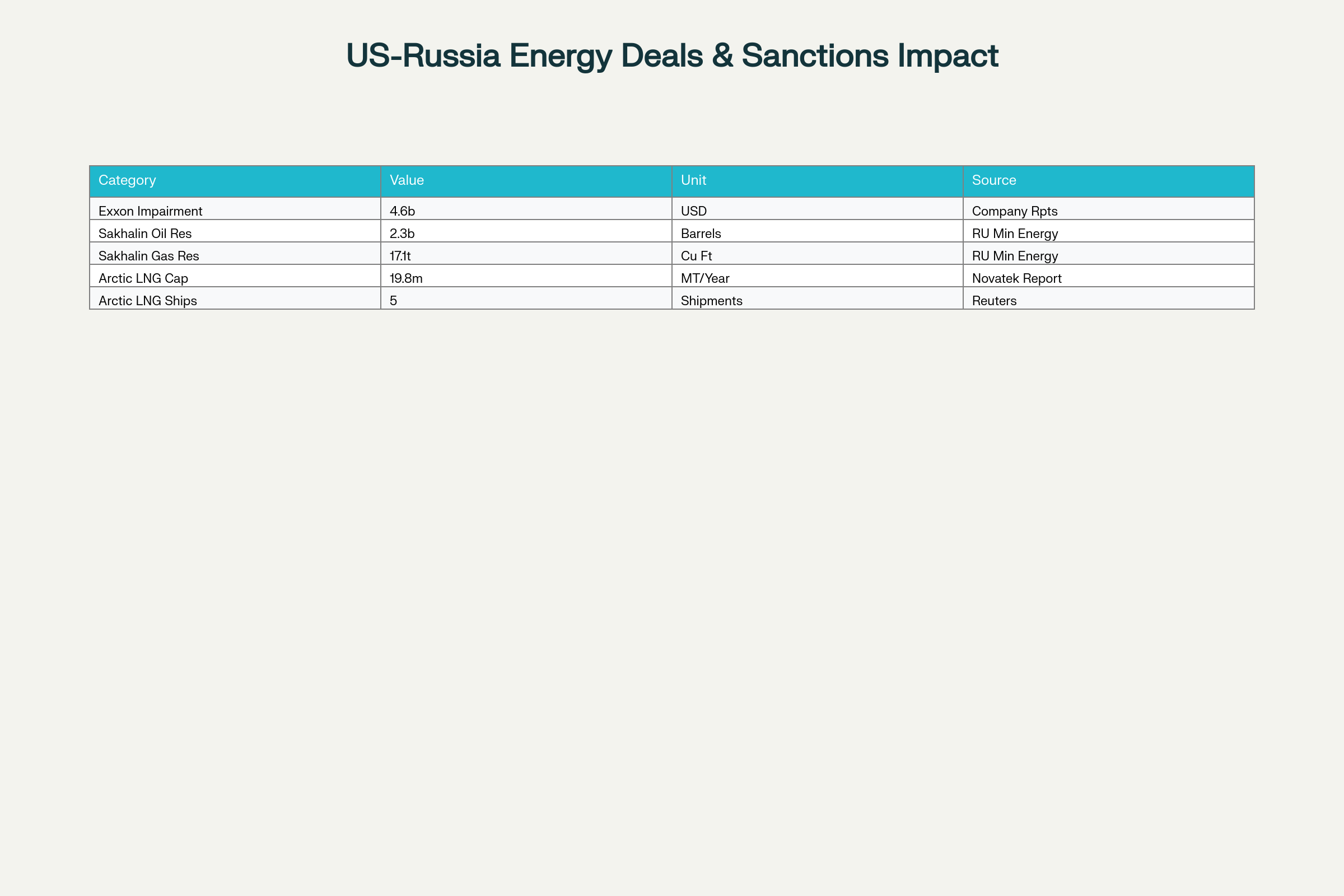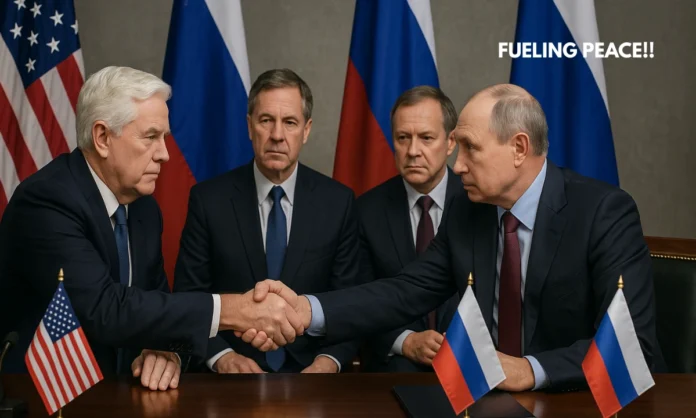Key Highlights
- US and Russian officials negotiated several energy deals to incentivize peace in Ukraine
- Exxon Mobil’s potential re-entry into Russia’s Sakhalin-1 project is a key focus
- Discussions include US equipment sales for Russian LNG projects under sanctions
Opening Overview
The energy deals came into sharp focus in August 2025 as US and Russian government officials discussed several potential arrangements designed to foster peace in Ukraine. These talks highlighted the significant role of energy deals negotiations as leverage in geopolitical conflict resolutions. Key negotiations included Exxon Mobil’s prospective return to Russia’s Sakhalin-1 oil and gas project and US equipment sales for sanctioned liquefied natural gas initiatives. The ongoing Ukrainian conflict has created complex barriers, with sanctions severely limiting Russian access to investment and technology, making these energy deals critical for future geopolitical and economic directions.
Trump is betraying Ukraine and thus Europe.
— Jürgen Nauditt 🇩🇪🇺🇦 (@jurgen_nauditt) August 26, 2025
But „daddy“.
US and Russia discuss energy agreement, Reuters.
According to Reuters, US and Russian officials discussed possible incentives for the Kremlin in exchange for progress in the negotiations during the meetings. These… pic.twitter.com/lckzUNawMJ
Energy Deals as Strategic Peace Incentives
- US and Russian officials used energy deals as leverage to promote peace talks
- These deals aimed to incentivize the Kremlin to agree to peace and prompted US sanction relaxation
Amid ongoing conflict in Ukraine and Western sanctions that have crippled the Russian energy sector, diplomatic talks in August 2025 revealed nuanced strategies by both Washington and Moscow. Officials proposed energy deals designed as quid pro quo incentives: Russia could gain investment and technology access in exchange for peace overtures. This included the clearest signal of potential Exxon Mobil reinvestment in Sakhalin-1 and the sale of US LNG technology and equipment to sanctioned Russian projects like Arctic LNG 2. These initiatives represent a complex balancing act amid global geopolitical pressure and economic interests, reflecting the multidimensional nature of peace negotiations. Energy deals here serve both security and economic stabilization objectives.
Exxon Mobil and Sakhalin-1: A Potential Revival
- President Putin signed a decree allowing foreign investors to reclaim stakes in Sakhalin-1
- Exxon Mobil, which exited in 2022, could return conditional on support for sanction lifting
Sakhalin-1 stands as a flagship oil and gas project in Russia’s Far East with extensive recoverable reserves of 2.3 billion barrels of oil and 17.1 trillion cubic feet of natural gas. After Exxon Mobil’s exit in 2022 following the Ukraine invasion, the Kremlin seized its 30% stake, causing a $4.6 billion impairment charge to the company.
However, a new decree by President Putin in August 2025 opens a pathway for Exxon and other foreign shareholders to re-enter the project. This return is contingent on active participation in advocating for lifting Western sanctions and commitment to project financing, including contracts for essential equipment. The geopolitical importance and economic scale of Sakhalin-1 make this potential component of energy deals a pivotal moment in the future of US-Russia energy cooperation.
LNG Project Challenges and US Equipment Sales
- Arctic LNG 2 faces multi-wave US sanctions restricting critical equipment and shipping
- US discussions focus on selling LNG equipment to Russia to shift away from Chinese technology
The Arctic LNG 2 project, majority-owned by Novatek, reflects Russia’s ambitions in the LNG sector but remains hampered by US and allied sanctions. These restrictions severely limit Russia’s access to ice-class vessels and technology, essential for the project’s operation with a projected capacity of 19.8 million metric tons annually.
However, recent energy deals discussions suggest Washington’s willingness to sell sanctioned LNG equipment to Russia, potentially facilitating operations while simultaneously undermining the China-Russia alliance by encouraging dependence on US technology. This approach symbolizes a broader US geopolitical strategy aimed at isolating China and recalibrating power dynamics in Eurasian energy markets. Despite sanctions, Arctic LNG 2 has resumed gas processing at reduced levels, with five LNG shipments loaded from the project in 2025. The prospect of Russia purchasing US equipment represents a significant shift in the energy deals landscape.

Additional Strategic Moves: Icebreaker Vessels and Diplomatic Context
- US considered buying Russian nuclear-powered icebreaker vessels to support Alaskan LNG development
- Broader bilateral energy deals discussed during diplomatic visits and the Alaska summit aim to secure peace progress
In addition to core energy deals, the US explored the acquisition of Russian nuclear-powered icebreaker vessels, vital for Arctic LNG operations, to support its domestic energy projects in Alaska. This proposal aligns with broader ongoing negotiations involving top-level officials, including President Trump and Russian President Putin, held in Moscow and at the Alaska summit. The talks demonstrate a shift towards bilateral engagement between the US and Russia, subtly sidelining European Union’s collective stance on Russian energy sanctions. While these energy deals signal potential thawing in relations, challenges remain with broader geopolitical tensions and ongoing conflict in Ukraine. The dialogue underscores the intersection of energy security and international diplomacy in a changing global order through strategic energy deals mechanisms.
Final Perspective
The energy deals discussed in 2025 epitomize the intricate dance of diplomacy leveraging economic interests to shape peace outcomes. While fraught with complexity and opposition from various geopolitical blocs, these discussions highlight the transformative role of energy deals in conflict resolution. Exxon Mobil’s possible return and strategic LNG equipment sales emphasize economic pragmatism amid political uncertainty through energy deals frameworks. These developments suggest that energy diplomacy will continue to be a crucial channel for dialogue, even as the broader conflict in Ukraine endures. Observing how these energy deals evolve will provide key insights into the future of US-Russia relations and global energy geopolitics.


